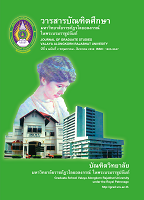ปัจจัยที่ส่งผลต่อประสิทธิผลการประกันคุณภาพการศึกษาภายในโรงเรียนจ่าอากาศ กรมยุทธศึกษาทหารอากาศ FACTORS AFFECTING THE EFFECTIVENESS OF INTERNAL EDUCATION QUALITY ASSURANCE OF AIR TECHNICAL TRANING SCHOOL UNDER THE DIRECTORATE OF EDUCATION AND
Main Article Content
Abstract
บทคัดย่อ
การศึกษาครั้งนี้มีวัตถุประสงค์เพื่อ 1) ศึกษาปัจจัยส่วนบุคคล และระดับปัจจัยองค์กรที่ส่งผลต่อประสิทธิผลการประกันคุณภาพการศึกษาภายใน โรงเรียนจ่าอากาศ กรมยุทธศึกษาทหารอากาศ 2) ศึกษาประสิทธิผลการประกันคุณภาพการศึกษาภายในโรงเรียนจ่าอากาศ 3) เสนอแนะแนวทางที่เหมาะสมในการพัฒนาระบบคุณภาพ และมาตรฐานการศึกษาโรงเรียนจ่าอากาศ การศึกษาครั้งนี้เป็นการวิจัยเชิงปริมาณโดยศึกษากลุ่มตัวอย่าง จำนวน 206 คน ขนาดกลุ่มตัวอย่างได้มาด้วยการคำนวณตามสูตรของทาโร่ ยามาเน่ และเลือกมาแบบเจาะจงจากกลุ่มประชากรที่เป็นข้าราชการ ลูกจ้าง พนักงานราชการ ของโรงเรียนจ่าอากาศจำนวน 426 คน เครื่องมือที่ใช้ในการวิเคราะห์ข้อมูลโดยสถิติ เชิงพรรณา ได้แก่ ร้อยละ ค่าเฉลี่ย ส่วนเบี่ยงเบนมาตรฐาน ค่าสถิติพิสูจน์สมมติฐานคือ ทดสอบที และทดสอบเอฟ และสัมประสิทธิ์สหสัมพันธ์เพียร์สัน
ผลการศึกษาพบว่า 1) ปัจจัยส่วนบุคคล เพศ อายุ ชั้นยศ การศึกษา ที่แตกต่างกัน มีความพึงพอใจต่อประสิทธิผลการประกันคุณภาพการศึกษาภายใน ที่ไม่ต่างกัน ระดับปัจจัยองค์กรที่ส่งผลต่อประสิทธิผลการประกันคุณภาพการศึกษาภายใน โรงเรียนจ่าอากาศ กรมยุทธศึกษาทหารอากาศ โดยรวมอยู่ในระดับมาก เมื่อพิจารณาเป็นรายด้าน พบว่า ปัจจัยที่ส่งผลต่อประสิทธิผลการประกันคุณภาพการศึกษาภายใน โรงเรียนจ่าอากาศ ในระดับมากมีอยู่ 2 ด้าน ได้แก่ ด้านความผูกพันต่อองค์กร ด้านสายงานที่ปฏิบัติ เรียงตามลำดับ ส่วนอีก 2 ด้าน คือด้านการบริหาร ด้านความรู้ความเข้าใจ อยู่ในระดับปานกลาง 2) ประสิทธิผลการประกันคุณภาพการศึกษาภายในโรงเรียนจ่าอากาศ ทั้ง 3 ด้าน พบว่า โดยรวมอยู่ในระดับมาก ได้แก่ คุณภาพด้านบุคลากร ด้านคุณภาพผู้รับการศึกษา ด้านคุณภาพการจัดการศึกษา เรียงตามลำดับ 3) แนวทางในการพัฒนาระบบคุณภาพและมาตรฐานการศึกษาโรงเรียนจ่าอากาศคือ (1) ด้านการบริหาร ควรควรปรับวิสัยทัศน์ในการบริหาร (2) ด้านสายงานที่ปฏิบัติ ควรปรับสายงานที่ปฏิบัติให้ตรงกับความรู้ความสามารถของบุคคลากร (3) ด้านผู้รับการศึกษา ควรสร้างแรงจูงใจให้แก่ผู้รับการศึกษาจัดหลักสูตรให้มีคุณภาพและมีความทันสมัย
ABSTRACT
The objectives of this research were 1) to study the level of personal factors and organizational factors affecting the effectiveness of internal education quality assurance of air technical training School under The Directorate of Education and Training Command, 2) to study the effectiveness level of internal education quality assurance of air technical training School and 3) to propose the appropriate guidelines for quality and standard system development of air technical training school under the Directorate of Education and Training Command. This study was a quantitative approach and was conducted by studying 206 samples. The sample size was computed by using Taro Yamane formula and purposively selected from 426 personnels, employees and government officers of the air technical training school. The tool for data collection was a questionnaire and the data were analyzed by percentage, mean, standard deviation, t-test, F-test and pearson’s product moment correlation coefficient
The research results were as follows: 1) the different personal factors; namely, gender, age, rank and educational level had no relation with the effectiveness of internal education quality assurance. The organization factors had affected the effectiveness of internal education quality assurance in overall at high level. The analysis in each aspect was found that the organization commitment and working position were related with the effectiveness at high level while the management and knowledge were related at a moderate level; 2) the effectiveness level of internal education quality assurance was at high in three dimensions of personnel aspect, quality of students and educational management quality, and 3) the proposed appropriate guidelines for quality and standard system development comprising three dimensions as follows: (1) the management vision should be enhanced more appropriately, (2) the working position should be adjusted to match with the personnel competency and (3) the student should be inspired by the qualified and modern curriculum and instruction system.
Article Details

This work is licensed under a Creative Commons Attribution-NonCommercial-NoDerivatives 4.0 International License.
บทความทุกเรื่องได้รับการตรวจความถูกต้องทางวิชาการโดยผู้ทรงคุณวุฒิ ทรรศนะและข้อคิดเห็นในบทความ Journal of Global of Perspectives in Humanities and Social Sciences (J-GPHSS) มิใช่เป็นทรรศนะและความคิดของผู้จัดทำจึงมิใช่ความรับผิดชอบของบัณฑิตวิทยาลัย มหาวิทยาลัยราชภัฏวไลยอลงกรณ์ ในพระบรมราชูปถัมภ์ กองบรรณาธิการไม่สงวนสิทธิ์การคัดลอก แต่ให้อ้างอิงแหล่งที่มา


